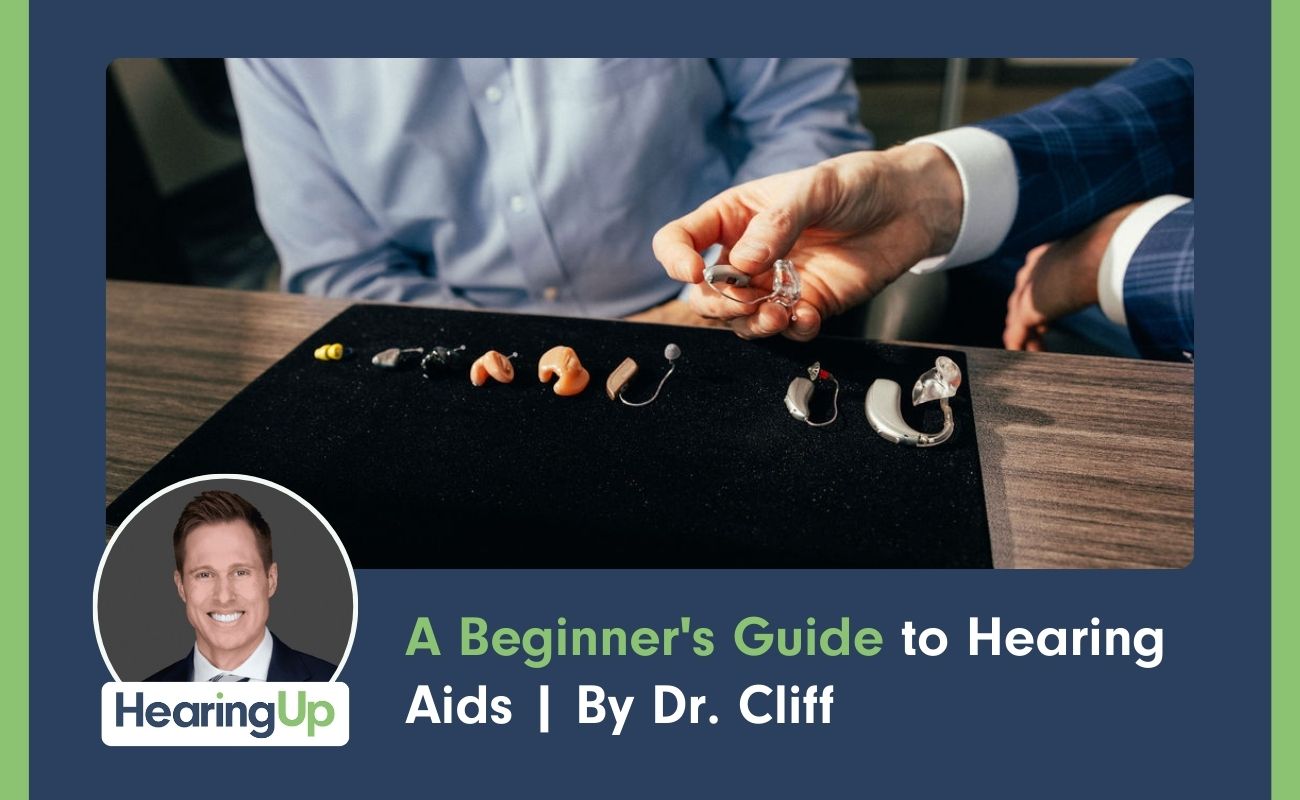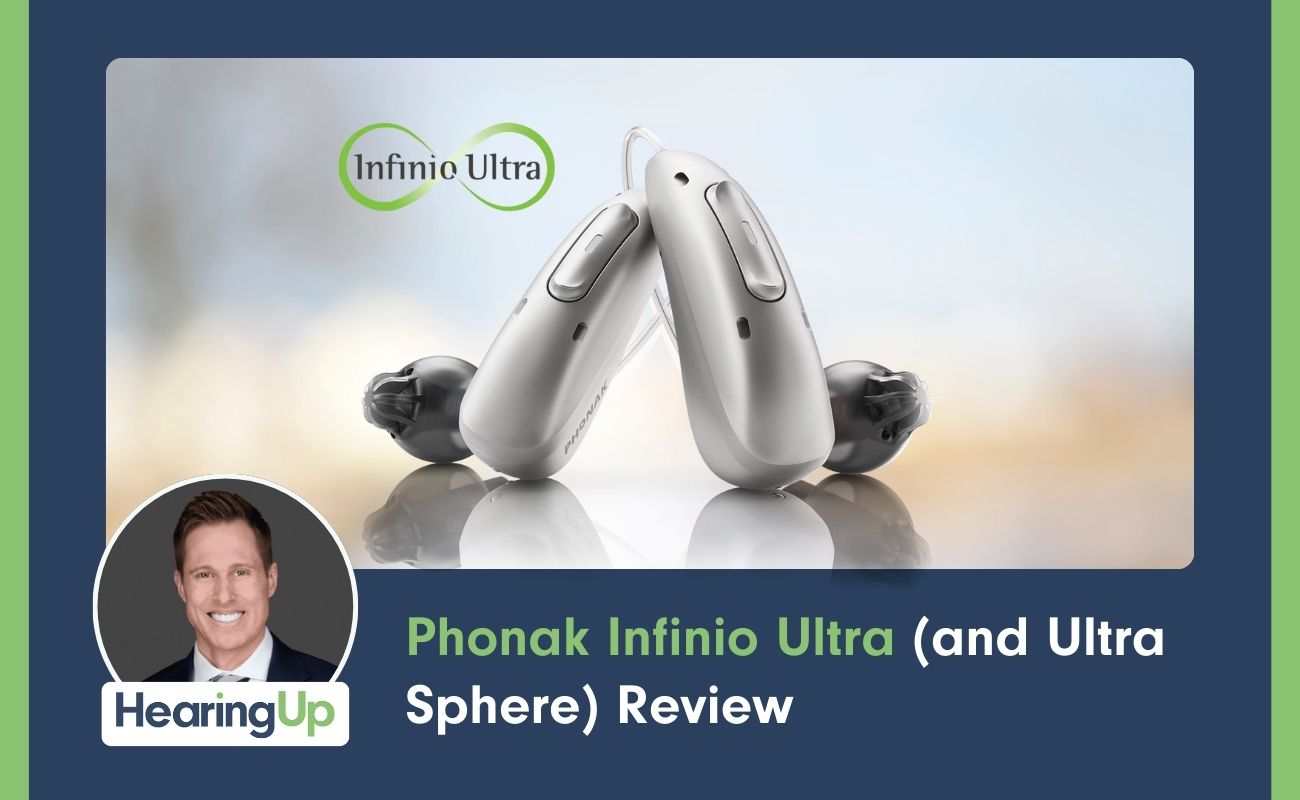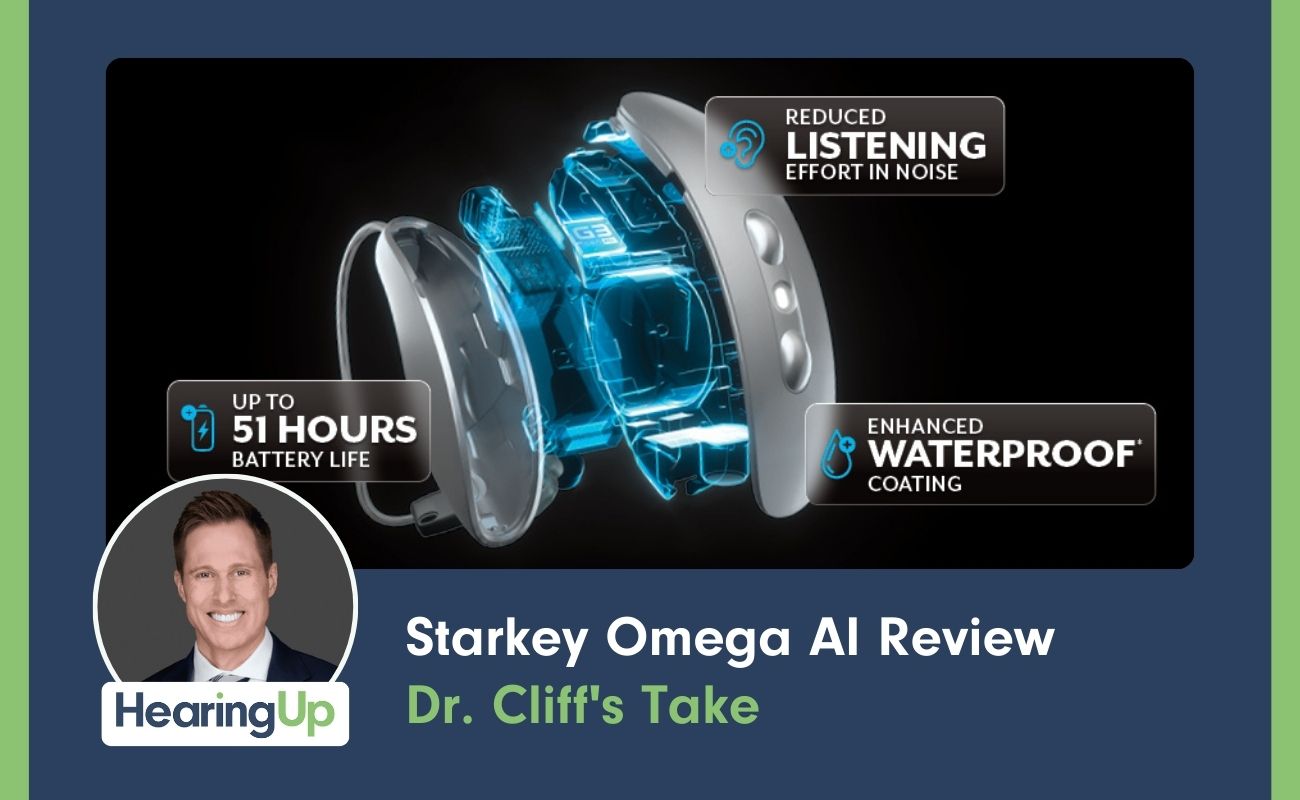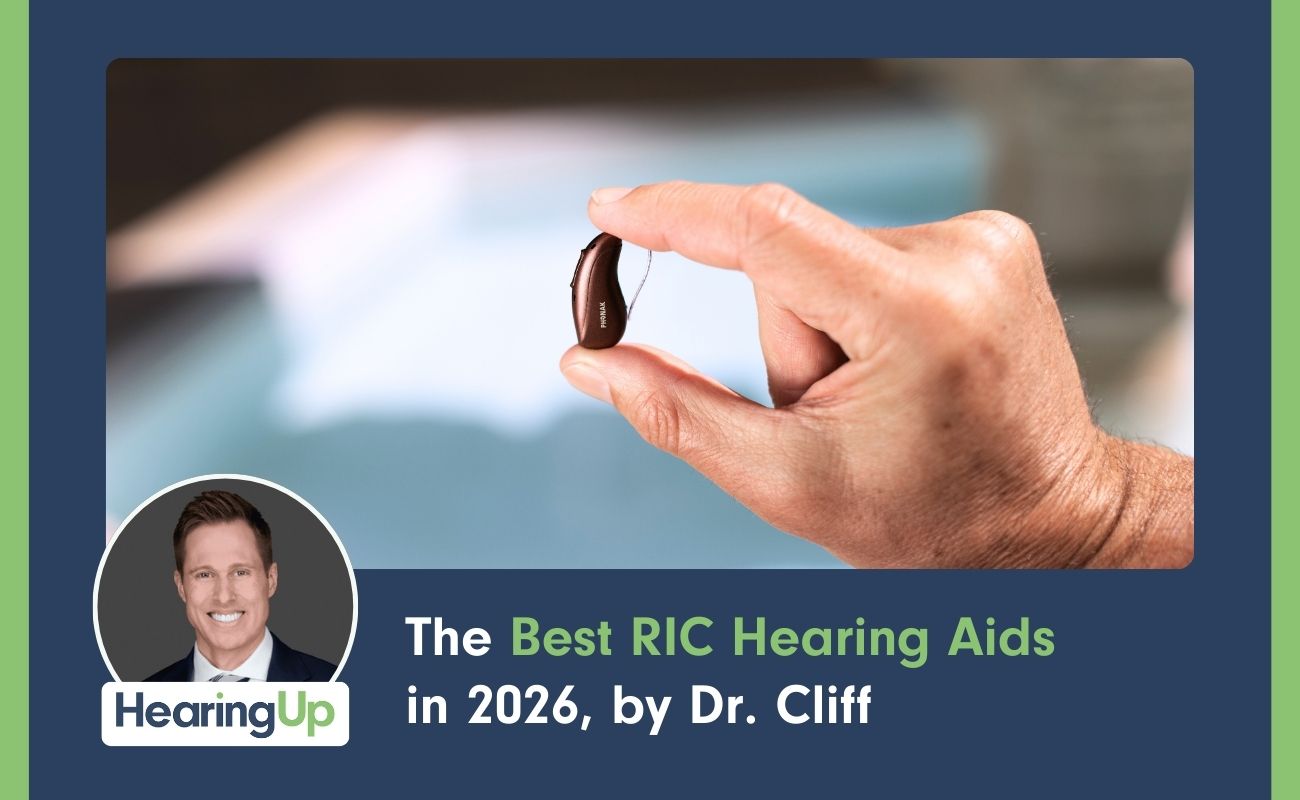Costco is known for offering hearing aids at surprisingly low prices—but why are they so much cheaper than those from private audiology clinics? In this episode of the Dr. Cliff AuD Vlog, I dive deep into the price disparity between Costco and independent hearing care providers.
If you've ever shopped around for hearing aids, you've probably experienced sticker shock when comparing prices between Costco and your local audiology clinic. The difference can be thousands of dollars, leaving many people wondering: "Am I paying too much, or is there really that big of a difference in what I'm getting?"
This question recently popped up in a Facebook hearing loss support group, and it's one I hear constantly from patients and viewers. Someone wrote: "I've been tested by an audiologist and I need hearing aids. I'm just beginning my research and I'm wondering why there is such a price difference between Sam's Club and Costco pricing and going through the audiologist. I realize that you get what you pay for, but why such a big difference in price?"
It's a fair question that deserves a straightforward answer. After analyzing both business models extensively, I've identified six key reasons why Costco can offer hearing aids at such dramatically lower prices.
Costco's massive purchasing power is probably their biggest advantage. When you have hundreds of hearing centers across the country all buying from the same few manufacturers, you can negotiate prices that small private practices simply cannot match.
Think about it this way: if your local audiologist orders 50 hearing aids per month, but Costco orders 5,000, who do you think gets the better wholesale price? This bulk purchasing power allows Costco to pass significant savings directly to their members.
Additionally, Costco intentionally limits their hearing aid options to just a few select models from major manufacturers. While this means fewer choices for you, it means even greater purchasing power for them, driving costs down further.
Most Costco hearing centers are staffed primarily by hearing instrument specialists rather than doctors of audiology. This isn't a judgment on competency – it's simply an economic reality. Hearing instrument specialists require less education and training, which typically translates to lower salary requirements.
While Costco does offer excellent benefits packages that help attract quality staff, their overall labor costs per hearing aid sold are significantly lower than private practices that employ doctors of audiology with advanced degrees and specialized training.
Walk into a Costco hearing center and you'll notice it's basically a small corner section of their warehouse – maybe a few hundred square feet at most. Compare that to a dedicated audiology clinic with multiple sound booths, waiting areas, consultation rooms, and specialized equipment spaces.
Interestingly, those small hearing aid sections generate some of the highest revenue per square foot in the entire Costco operation (second only to wine and alcohol sales). But because the physical footprint is so small, overhead costs remain minimal, allowing for lower hearing aid prices.
When you visit most Costco hearing centers, you'll typically work with just one person – the hearing instrument specialist or audiologist. There's usually no dedicated front office staff, no hearing aid technicians, and no audiology assistants providing additional support.
While this streamlined approach keeps costs down, it also means less personalized attention and support throughout your hearing aid journey. Private practices often employ entire teams to ensure comprehensive care, but those additional salaries have to be factored into pricing.
Time is money in any business, and this is especially true in hearing healthcare. During my research, I found that Costco typically spends about 1.5-2 hours total with patients from initial testing through fitting and follow-up.
Compare that to comprehensive private practice care, where patients often receive 6-7 hours of professional time throughout their initial fitting process. This includes detailed consultations, precise measurements, multiple adjustment appointments, and thorough training on device use and maintenance.
The reduced time investment allows Costco to see more patients per day and keep their profit margins workable despite lower prices. However, it also means less individualized attention and potentially less optimal outcomes for complex hearing losses.
Here's where things get controversial, but it's important to address: while Costco does require Real Ear Measurements (which is excellent), the quality and comprehensiveness of care can vary significantly between locations.
Some Costco providers are exceptional and follow comprehensive best practices, while others may take a more basic approach. The level of ongoing training and quality control isn't standardized to the same degree you'd typically find in specialized audiology practices.
Of course, everything I've outlined about Costco's cost-saving measures represents the exact opposite approach taken by private practice audiology clinics. Private practices typically offer:
Neither approach is inherently right or wrong – they're simply different business models serving different needs and budgets. Some people prioritize cost savings and are satisfied with a more basic level of service. Others prefer comprehensive care and are willing to pay more for extensive professional attention and support.
The key is understanding what you're getting (and not getting) with each option, so you can make an informed decision that aligns with your hearing needs, lifestyle, and budget.
Before making your choice, consider factors like the complexity of your hearing loss, your technology comfort level, and how much ongoing support you'll want throughout your hearing aid journey.
Want to dive deeper into this comparison and hear real examples? Check out the full video where I break down each of these factors in detail and share specific patient experiences that illustrate these differences.
So that's why Costco's hearing aid prices are so low.
Hey guys, welcome back to the Dr. Cliff AuD vlog. This is vlog number 270, and today I wanna talk to you guys about the price disparity between Costco and private practice hearing aid clinics.
But before I do, do me a huge favor, click the like button really helps out my channel. And if you are not on that, yeah, subscribe to the channel with notifications turned on. Go ahead and do that as well. It is greatly appreciated.
Alright, so every single time I bring up Costco on my YouTube channel, I get a bunch of negative comments in the comment section. So please feel free, go and leave your negative comment right now as I get into the topic of today's video.
So there was actually a post on social media a couple of weeks ago and it was on a Facebook group page. And you know, I go onto Facebook group pages all the time and check out and see what questions are being asked on there. But here is one, and this individual asked a question.
I have been tested by an audiologist and I need hearing aids. I'm just beginning my research and I'm wondering why there is such a price difference between Sam's Club and Costco pricing and going through the audiologist, I realize that you get what you pay for, but why such a big difference in price?
So there's a couple of different ways that you could view this perspective. You could either take the perspective of Costco and how they get their hearing aid prices so low, or you could take the perspective of the private practice audiology clinic and identify why they have their prices so much higher compared to Costco.
For this video, I feel like I'm gonna take the Costco side of things to kind of explain how they're able to drive their prices as low as possible. And then you can basically look at it from the exact opposite lens if you want to see what it's like from the private practice audiology perspective.
So at the end of the day, I identified six reasons why the pricing at Costco is so much lower than your local audiology clinic.
So the first one here is you have less options when you go to Costco. So the less hearing aid manufacturers that you offer, the lower your prices can be because you can purchase more devices from each one of those manufacturers.
When you look at it from Costco's perspective, they only have a few different options of hearing aids. When you have fewer options, they're gonna be able to negotiate down the pricing of those devices so they can offer a better price to their members who come there for hearing treatment.
Now the other aspect of this is is that the cost of goods for Costco is so much lower than a private practice audiology clinic because there's so many Costco's out there. So basically Costco gets to unite the purchasing power of all of their different hearing aid centers to make sure that they drive down the purchasing price or cost of goods of those devices as low as humanly possible.
And that my friend, is just the power of being able to purchase so many units that you can drive the cost of each one of those units as low as humanly possible and then pass those savings onto the person who comes and purchases from a Costco location.
The second reason why pricing at Costco is so much lower is that they typically hire hearing instrument specialists, not doctors of audiology. Now, I am in no way, shape or form saying that an audiologist is better than a hearing instrument specialist or vice versa. I'm just making the statement that hearing instrument specialists typically make less money than doctors of audiology. They require less education, less schooling, so on so forth.
So in order for Costco hearing centers to keep their hearing centers staffed, they typically have to go with the hearing instrument specialist. And the benefit of that is they can typically pay them less money. And because Costco, it's such a big organization, they have really good benefits for their employees. So where you may sacrifice in terms of having to pay someone their salary, you can typically justify it by getting a good benefits package along with it.
And this all helps Costco hearing aid centers to be able to reduce their overhead, which is the third reason why pricing at Costco is so much lower because all they're doing is taking a few hundred square feet in the corner of their warehouse. Sure, they could stock that square footage with with additional toilet paper or something like that and actually make revenue in that corner.
But what we know from Costco hearing centers is that the revenue that they generate per square foot is massive. In fact, a couple years ago the hearing aid centers were the second highest revenue generating center of Costco, only second to wine in alcohol sales.
But because they only have a small area inside of their warehouse to set up their hearing center, it is significantly smaller amount of space than what you'll find at a private practice audiology clinic, which is usually, I don't know, five to 10 times larger than the space that you'll find at a Costco hearing center.
But of course, if you can keep your overhead really low, it means that you do not have to increase your hearing aid pricing as much to cover the cost of that overhead.
Now the fourth thing really kind of goes into the overhead aspect of this as well, but they typically have to staff their hearing centers with less people. Oftentimes when you go to a Costco hearing Center, they have one person there and that is the hearing instrument specialist or audiologist who's going to be working with you. They typically don't have dedicated front office staff. They typically do not have hearing aid assistance or audiology assistance that are working there to support you. You basically only have that one provider in there.
And when you only have to pay the salary of one provider versus paying a whole team of people to provide you with support, you can typically charge less for your hearing aids.
The fifth reason why pricing is so much lower in a Costco hearing aid center is that they spend significantly less amount of time with you. Now, I'm sure that there are cases where some individuals go into Costco all the time and get help with their hearing aids, but generally speaking, your Costco Hearing Center will spend significantly less time with you than what a private practice audiologist would.
And time as you know, is money. When I had my assistant brie go and get hearing aids from Costco, they spent like a total of hour and a half with her from the testing and their initial fitting, and they did have her come in for an additional follow up. So it was about two hours of total time in our clinic. I'll just use us as an example. Throughout the testing and fitting sequence, we're spending six and a half hours with you, but inside of a Costco hearing center, if they were to spend six and a half hours with all of their patients, their hearing aid pricing would have to go up and go up by a lot because at the end of the day, they are a sales organization, they're driven by unit sales.
Anytime that you have a very low profit margin, you have to sell a lot of that item in order to make selling that item. Make sense? And again, I'm not hating on Costco here, I'm just explaining why they're able to get their hearing aid pricing so low. And one of the biggest variables of that is the limited amount of time that they have to spend with you. And this is just on the initial fitting. It doesn't include the amount of reduced time that they have to spend with you as the years go on.
And the sixth reason why pricing is so much lower at a Costco hearing aid center than a private practice audiology clinic is the lack of quality control. Now, this is gonna rub some people the wrong way, but inside of Costco it is mandatory that they complete real or measurement at your hearing aid fitting, but how good the quality of them adjusting the devices are is totally random based on the place that you go.
So if you end up going to a place out here in the greater Phoenix area, we get a ton of people who come in who are not happy with their Costco hearing aids out here in Phoenix. There are some of you out there who absolutely love your hearing aids, and that's because you went to either a really good provider or the provider you went to was really good at following best practices. But that is by no means mandated by Costco, at least not from what I can tell.
There are a lot of people who go to Costco and have success, and there's a lot of people who go to Costco and do not have success, and the limited amount of training that they provide their staff is the reason for that. If you ask me, we do a ton of training inside of my clinic. I have no idea how much training Costco does inside of their clinics, but I have to imagine that it's not very much.
And because they don't spend all of this time training their providers at a really, really high level following comprehensive AUDIOLOGIC best practices, it means that they get to save money on this lack of training and then ultimately they can pass that savings onto you.
And there you go. Those are the six reasons why you'll spend significantly less money going to a Costco Hearing center to get hearing aids versus going to a private practice audiology clinic.
Now, like I said earlier, you can basically just take all of those points and flip them around, and that is why you spend so much more going to a private practice audiology clinic.
When you go to a private practice audiology clinic, they typically have more hearing aid options to find the ideal hearing aid for you, but it also means that their purchasing power is worse, so they cannot pass on as many savings to you by negotiating down the cost of goods from a hearing aid manufacturer.
Private practice audiology clinics typically pay their providers more, and they typically have doctors of audiology or hearing instrument. But anytime that you also have a doctor of audiology, you're typically going to pay them more money, which will increase the cost of devices.
There is significantly more overhead in a private practice audiology clinic because they typically have more staff that they have to keep on site. They typically have more test booths, they can see more patients at one time. But again, that all increases the cost of doing business, which means that it increase the cost of the hearing aids like I just mentioned.
They'll typically have significantly more support staff to support you if and when anything goes wrong with your hearing aids. Private practice audiology clinics also typically spend significantly more time with patients and time, like I said earlier, is money.
And last but not least, private practice audiology clinics typically spend significantly more time training and following comprehensive audiologic best practices. Now, if you're having trouble finding a clinic that actually follows best practices, make sure that you go to my website hearing up.com and find a hearing up network member in your area in order for you to get the most benefit from your hearing aids humanly possible.
But at the end of the day, you have to decide for yourself which one makes more sense. Do you want to go the lower cost Costco route or do you want to go the higher cost private practice route? It really just depends on the individual.
Let me know which route you prefer to go down in the comment section.
So that's why Costco's hearing aid prices are so low.
Hey guys, welcome back to the Dr. Cliff AuD vlog. This is vlog number 270, and today I wanna talk to you guys about the price disparity between Costco and private practice hearing aid clinics.
But before I do, do me a huge favor, click the like button really helps out my channel. And if you are not on that, yeah, subscribe to the channel with notifications turned on. Go ahead and do that as well. It is greatly appreciated.
Alright, so every single time I bring up Costco on my YouTube channel, I get a bunch of negative comments in the comment section. So please feel free, go and leave your negative comment right now as I get into the topic of today's video.
So there was actually a post on social media a couple of weeks ago and it was on a Facebook group page. And you know, I go onto Facebook group pages all the time and check out and see what questions are being asked on there. But here is one, and this individual asked a question.
I have been tested by an audiologist and I need hearing aids. I'm just beginning my research and I'm wondering why there is such a price difference between Sam's Club and Costco pricing and going through the audiologist, I realize that you get what you pay for, but why such a big difference in price?
So there's a couple of different ways that you could view this perspective. You could either take the perspective of Costco and how they get their hearing aid prices so low, or you could take the perspective of the private practice audiology clinic and identify why they have their prices so much higher compared to Costco.
For this video, I feel like I'm gonna take the Costco side of things to kind of explain how they're able to drive their prices as low as possible. And then you can basically look at it from the exact opposite lens if you want to see what it's like from the private practice audiology perspective.
So at the end of the day, I identified six reasons why the pricing at Costco is so much lower than your local audiology clinic.
So the first one here is you have less options when you go to Costco. So the less hearing aid manufacturers that you offer, the lower your prices can be because you can purchase more devices from each one of those manufacturers.
When you look at it from Costco's perspective, they only have a few different options of hearing aids. When you have fewer options, they're gonna be able to negotiate down the pricing of those devices so they can offer a better price to their members who come there for hearing treatment.
Now the other aspect of this is is that the cost of goods for Costco is so much lower than a private practice audiology clinic because there's so many Costco's out there. So basically Costco gets to unite the purchasing power of all of their different hearing aid centers to make sure that they drive down the purchasing price or cost of goods of those devices as low as humanly possible.
And that my friend, is just the power of being able to purchase so many units that you can drive the cost of each one of those units as low as humanly possible and then pass those savings onto the person who comes and purchases from a Costco location.
The second reason why pricing at Costco is so much lower is that they typically hire hearing instrument specialists, not doctors of audiology. Now, I am in no way, shape or form saying that an audiologist is better than a hearing instrument specialist or vice versa. I'm just making the statement that hearing instrument specialists typically make less money than doctors of audiology. They require less education, less schooling, so on so forth.
So in order for Costco hearing centers to keep their hearing centers staffed, they typically have to go with the hearing instrument specialist. And the benefit of that is they can typically pay them less money. And because Costco, it's such a big organization, they have really good benefits for their employees. So where you may sacrifice in terms of having to pay someone their salary, you can typically justify it by getting a good benefits package along with it.
And this all helps Costco hearing aid centers to be able to reduce their overhead, which is the third reason why pricing at Costco is so much lower because all they're doing is taking a few hundred square feet in the corner of their warehouse. Sure, they could stock that square footage with with additional toilet paper or something like that and actually make revenue in that corner.
But what we know from Costco hearing centers is that the revenue that they generate per square foot is massive. In fact, a couple years ago the hearing aid centers were the second highest revenue generating center of Costco, only second to wine in alcohol sales.
But because they only have a small area inside of their warehouse to set up their hearing center, it is significantly smaller amount of space than what you'll find at a private practice audiology clinic, which is usually, I don't know, five to 10 times larger than the space that you'll find at a Costco hearing center.
But of course, if you can keep your overhead really low, it means that you do not have to increase your hearing aid pricing as much to cover the cost of that overhead.
Now the fourth thing really kind of goes into the overhead aspect of this as well, but they typically have to staff their hearing centers with less people. Oftentimes when you go to a Costco hearing Center, they have one person there and that is the hearing instrument specialist or audiologist who's going to be working with you. They typically don't have dedicated front office staff. They typically do not have hearing aid assistance or audiology assistance that are working there to support you. You basically only have that one provider in there.
And when you only have to pay the salary of one provider versus paying a whole team of people to provide you with support, you can typically charge less for your hearing aids.
The fifth reason why pricing is so much lower in a Costco hearing aid center is that they spend significantly less amount of time with you. Now, I'm sure that there are cases where some individuals go into Costco all the time and get help with their hearing aids, but generally speaking, your Costco Hearing Center will spend significantly less time with you than what a private practice audiologist would.
And time as you know, is money. When I had my assistant brie go and get hearing aids from Costco, they spent like a total of hour and a half with her from the testing and their initial fitting, and they did have her come in for an additional follow up. So it was about two hours of total time in our clinic. I'll just use us as an example. Throughout the testing and fitting sequence, we're spending six and a half hours with you, but inside of a Costco hearing center, if they were to spend six and a half hours with all of their patients, their hearing aid pricing would have to go up and go up by a lot because at the end of the day, they are a sales organization, they're driven by unit sales.
Anytime that you have a very low profit margin, you have to sell a lot of that item in order to make selling that item. Make sense? And again, I'm not hating on Costco here, I'm just explaining why they're able to get their hearing aid pricing so low. And one of the biggest variables of that is the limited amount of time that they have to spend with you. And this is just on the initial fitting. It doesn't include the amount of reduced time that they have to spend with you as the years go on.
And the sixth reason why pricing is so much lower at a Costco hearing aid center than a private practice audiology clinic is the lack of quality control. Now, this is gonna rub some people the wrong way, but inside of Costco it is mandatory that they complete real or measurement at your hearing aid fitting, but how good the quality of them adjusting the devices are is totally random based on the place that you go.
So if you end up going to a place out here in the greater Phoenix area, we get a ton of people who come in who are not happy with their Costco hearing aids out here in Phoenix. There are some of you out there who absolutely love your hearing aids, and that's because you went to either a really good provider or the provider you went to was really good at following best practices. But that is by no means mandated by Costco, at least not from what I can tell.
There are a lot of people who go to Costco and have success, and there's a lot of people who go to Costco and do not have success, and the limited amount of training that they provide their staff is the reason for that. If you ask me, we do a ton of training inside of my clinic. I have no idea how much training Costco does inside of their clinics, but I have to imagine that it's not very much.
And because they don't spend all of this time training their providers at a really, really high level following comprehensive AUDIOLOGIC best practices, it means that they get to save money on this lack of training and then ultimately they can pass that savings onto you.
And there you go. Those are the six reasons why you'll spend significantly less money going to a Costco Hearing center to get hearing aids versus going to a private practice audiology clinic.
Now, like I said earlier, you can basically just take all of those points and flip them around, and that is why you spend so much more going to a private practice audiology clinic.
When you go to a private practice audiology clinic, they typically have more hearing aid options to find the ideal hearing aid for you, but it also means that their purchasing power is worse, so they cannot pass on as many savings to you by negotiating down the cost of goods from a hearing aid manufacturer.
Private practice audiology clinics typically pay their providers more, and they typically have doctors of audiology or hearing instrument. But anytime that you also have a doctor of audiology, you're typically going to pay them more money, which will increase the cost of devices.
There is significantly more overhead in a private practice audiology clinic because they typically have more staff that they have to keep on site. They typically have more test booths, they can see more patients at one time. But again, that all increases the cost of doing business, which means that it increase the cost of the hearing aids like I just mentioned.
They'll typically have significantly more support staff to support you if and when anything goes wrong with your hearing aids. Private practice audiology clinics also typically spend significantly more time with patients and time, like I said earlier, is money.
And last but not least, private practice audiology clinics typically spend significantly more time training and following comprehensive audiologic best practices. Now, if you're having trouble finding a clinic that actually follows best practices, make sure that you go to my website hearing up.com and find a hearing up network member in your area in order for you to get the most benefit from your hearing aids humanly possible.
But at the end of the day, you have to decide for yourself which one makes more sense. Do you want to go the lower cost Costco route or do you want to go the higher cost private practice route? It really just depends on the individual.
Let me know which route you prefer to go down in the comment section.

Hearing aid success requires 90-min evaluations, Real Ear Measurement programming, appropriate tech selection, 30-day adaptation and ongoing professional follow-up.
Read More
Phonak Infinio Ultra firmware adds AutoSense OS 7.0 (24% better), 30% improved battery (10hrs with AI), simplified Bluetooth pairing, and faster feedback tests.
Read More
Starkey Omega AI improves on Edge AI with DNN 360 (19.6% better speech clarity), spatial awareness, find-my-hearing-aid lights, and 20x stronger custom shells.
Read More
HRV objectively measures stress affecting tinnitus by tracking autonomic balance, enabling data-driven treatment adjustments via Modern Tinnitus Basecamp.
Read More
AirPods Pro 3 with iOS 18.1+ offer clinical-grade hearing aid features for mild-moderate loss, including built-in testing, custom amplification, and audiogram uploads.
Read More
Top 2026 RIC hearing aids: Phonak Ultra Sphere Infinio (AI noise reduction), Starkey Omega AI, Oticon Intent, Signia IX, Widex SmartRIC.
Read More